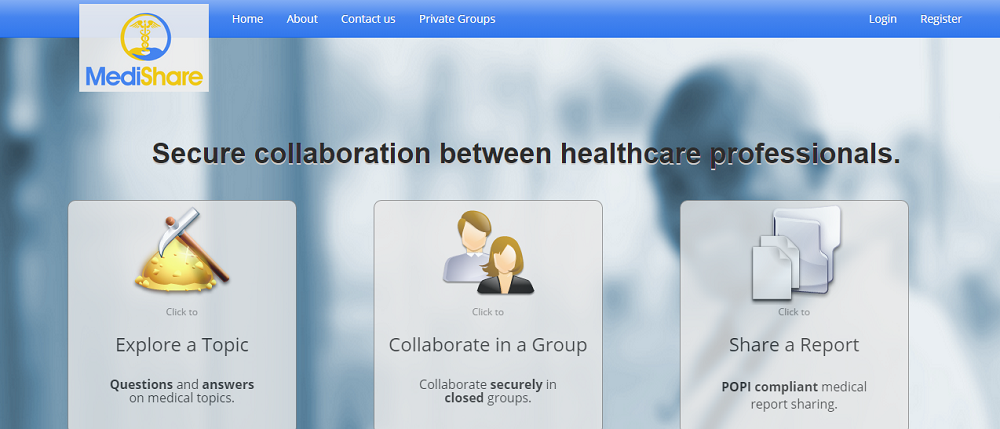South African startup Medishare is building a vertical professional network for the country’s doctors and other healthcare professionals, looking to provide a time-efficient way for individuals in the sector to share reports and other information.
Founded last year, Medishare is designed to address certain requirements of the Protection of Personal Information (POPI) Act when it comes to doctors and patients, while also raising awareness around specific medical issues such as diabetes.
Its aim is to facilitate the sharing of information by health practitioners via reports or on forums as quickly as possible, taking advantage of the the positive aspects of social media while streamlining the process so as not to waste the time of users.
Medishare claims its software is simpler and safer than sharing reports via fax or email, managing shared documents via other programmes, switching between various forms of communications to refer to or follow up on patients, and keeping reports and critical documents in paper folders or external hard drives.
“We believe that while social networking and other recent internet standards have had significant impact on most people’s lives – including the way they work –-healthcare professionals make very little use of these tools to communicate and collaborate within their professional environments,” Brett Steingo, founder and chief executive officer (CEO) of Medishare, told Disrupt Africa.
“We hope to bring these benefits to healthcare professionals in a simple, tailored way so that time investments by the practitioners are easily justified and result in benefits as soon as possible.”
Having began with secure report sharing in preparation for POPI, Medishare soon had almost 100 doctors on the site sharing and reading reports, with the company having done no marketing of its product.
Steingo said though this number was small the report sharing led to discussions and the advent of the startup’s Advisory Forums. The forums allow healthcare professionals to ask each other questions and receive answers on specific topics.
“We have combined what content providers do on their sites – whereby expert panels are in place to write comprehensive responses – with the crowd-sourced Q&A functionality of sites like Quora and Reddit,” he said.
This combination is starting to reap rewards for the startup. Steingo said Medishare has recently signed a contract with a large organisation that houses over 1,000 healthcare professionals, which will be using the platform to facilitate both private groups for members and an Advisory Forum open to all practitioners registered on Medishare.
Steingo said the inspiration for Medishare had come from his father, a cardiologist who previously worked with a software developer to build a Practice Management Programme for medical doctors. Though the product was built, it never turned into a business, but Steingo said he became interested in the idea of a cloud-based portal.
“I wanted to build something for doctors that resided completely in the cloud. I worked on a few experiments with some small development companies and freelance developers,” he said. “Eventually I decided to find a technical co-founder and try to create a vertical professional network for healthcare professionals in South Africa.”
This co-founder was Hector Beyers, a former colleague, with both men leaving their jobs at Internet Solutions last year to work on the company, which Steingo said is filling two important gaps. The first of these gaps is the fact most communication between doctors was “inefficient, expensive and non-compliant”, in terms of POPI.
“The truth is that while doctors are slowly catching on, the pain is not bad enough yet to motivate mainstream behavioural change. Some doctors will still write on a piece of paper and fax the note to another doctor!” he said, saying they needed to be moved to more secure platforms.
“So for now the report sharing functionality has attracted early adopters and will continue to grow. What was interesting were the discussions forming around the documents those doctors were sharing with each other – and that tied in with the larger picture.”
He said the second gap filled by Medishare was the fact that specific communications such as those between GPs and specialist physicians, despite being highly valued by both parties, are often inefficiently coordinated.
“It’s clear that there is a need for healthcare practitioners to communicate and collaborate more effectively and a vertical professional network is ideal to facilitate that,” Steingo said. “They are certainly on the rise as professionals seek online environments better suited to their needs.”
Medishare’s business model is based on advertising and sponsorship, though Steingo said the company was wary about spamming doctors.
“We want to make sure all information received is relevant and strictly opt-in only,” he said.
“The Premium Advisory Forums for example are paid for by corporate sponsors. For a monthly fee we source the subject-matter-experts and negotiate payment for their contribution. This ensures that key forums are attended to not just by the community at large, but also by experts in the field who are committed to taking a bit more time and providing quality content.”
He said the biggest challenge when pursuing a business model that relies on doctors is that “their chief scarcity is time”.
“You can’t just “get out of the building” and go talk to eight doctors in a day to ask them what they think about your ideas / product. You need to engage them in different ways and really be creative about adding value along every step of the relationship building process,” he said.
“Getting doctors from ‘basic awareness’ of your product to a point where they really trust – or even promote – what you are doing, takes a lot of hard work and perseverance.”
However, Steingo said the company really believed that the adoption by healthcare professionals of such technologies is inevitable.
“The vertical professional network for healthcare professionals will truly impact healthcare in this country – helping us to catch up with what doctors in North America, for example, are already doing. This can only result in better overall healthcare practice and patient care.”


